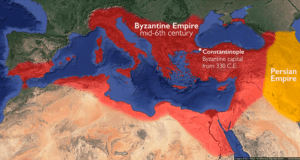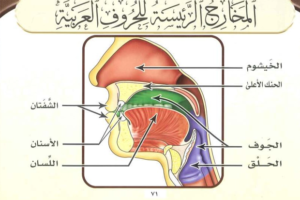
Islam And The World – Part 1
The Rise And Decline Of Muslims And Its Effect On Mankind
The World Before The Advent Of The Prophet Muhammad ﷺ

The World in The Sixth Century CE
The sixth century of the Christian era, it is generally agreed, represented the darkest phase in the history of our race. Humanity had reached the edge of the precipice, towards which it had been tragically proceeding for centuries, and there appeared to be no agency or power in the whole world which could come to its rescue and save it from crashing into the abyss of destruction.
In his melancholy progress from God-forgetfulness to self-forgetting, the man had lost his direction. He had grown indifferent to his destiny. The teachings of the prophets had been forgotten; the fire that they had kindled had either been put out by the stones of moral anarchy or the light they shed had become so feeble that it could illumine only the hearts of a few men, most of whom had sought refuge in passivity and resignation. Having been vanquished in the battle between spiritualism and materialism, they had shut themselves up in monasteries or gone into the “wilderness. Those who were left in the whirlpool of life had aligned themselves with the ruling classes of their lands. They helped them in the satisfaction of their sensual desires and the maintenance of unjust political and economic systems and co-operated in reaping unlawful benefits out of the wealth of the people.
The Romans and the Persians enjoyed the monopoly of leadership in the West and the East respectively and it had sunk them into a state of utter moral depravity. They wallowed in the deep-rooted vices of their corrupt and decaying civilizations. Their empires had become storehouses of confusion and mischief.
The governing classes, drunk with power, indulged in reckless debauchery and sensuality. The middle classes, as is their wont, took great pride in aping the modes and manners of the rich. As for the common people, they lived in grinding poverty. They filled their bellies like lower creatures and toiled and sweated like cattle so that others might live in voluptuous luxury. They would solace themselves with narcotics and cheap entertainment or fall blindly into carnal pleasures whenever their miserable lives afforded them breathing space.
Spiritual Inactivity
Great religions became playthings in the hands of debased dirt men who corrupted and twisted them beyond recognition, so much so that, if it were possible for their founders to return to physical life, they would not have recognized them.
As a result of the moral debasement of the great centers of civilization and general disorder and unrest, people everywhere became entangled in their internal problems. They had no message to offer to the world. The world had become hollow from within; its life springs had dried up. It possessed neither the light of religious guidance for personal conduct nor any abiding and rational principles for running a State.
Christianity
Christianity had never possessed a comprehensive or elaborate code that could provide the framework of a civilization or the basis of a government. Consisting mainly of the barest outlines of the teachings of Christ, it did little more than dimly reflect the simple creed of monotheism. But even this distinction was removed by the baneful influence of St Paul. After that, the flickering flame of the Divine Truth was utterly extinguished. St Paul did not let go of the old pagan rites and customs and introduced them into Christianity. Later, during the reign of Constantine, the very roots of the Christian faith were destroyed.
Thus, by the fourth century, Christianity had become a curious mixture of Greek mythology, Roman idolatry, Egyptian Neoplatonism, and Monasticism, in which the pure and simple teachings of Christ had been lost like a drop of sweet water in the ocean. The religion had been reduced to a hopeless mess of meaningless doctrines and empty rituals which could neither elevate the spirit, illuminate the intellect, nor move the emotions. Instead of opening fresh avenues for the display of cultural energies, this great religion had become a stumbling block in the path of human progress. Centuries of morbid disintegration had ushered the faith of Jesus into the lap of Paganism. Sale, who translated the Holy Qur’an into English, says of Christianity in the sixth century: “The worship of saints and images, in particular, was then arrived at such a scandalous pitch that it even surpassed whatever is now practiced among the Romanists”.
Social Discontent and Economic Chaos
The nations of North-Western Europe had not yet seen the dawn of civilization. They were steeped in the darkness of their abject state, broken down by endless bloody tumults. Muslims and Arab Spain had
not yet appeared on the stage of history to show them light nor had any historical calamity of such magnitude befallen them that could have jolted them into a.n awakening. They were cut off from the broad stream of humanity and knew very little of the world around them. Religiously, these nations stood between the new Christianity and the old idolatry. In the words of H.G. Wells, “there was no sign of order or union” in Western Europe”.
To sum up: “From the fifth to the tenth century, Europe lay sunk in a night of barbarism which grew darker and darker. It was a barbarism far more awful than that of the primitive savage, for it was the decomposing body of what had once been a great civilization. The features and impresses of that civilization were all but completely effaced. Where its development had been fullest, in Italy and Gaul, all was ruin, squalor, and dissolution.
For more information, continue reading here:
Islam And The World – Part 2
References:
English Islam and the World
https://www.muslim-library.com/dl/books/English-Islam-And-The-World.pdf
By: SAYYED ABUL HASAN ‘ALI NADWI
Translated by: Dr. Muhammad Asif Kidwai
The Map:
Byzantine Iconoclasm and the Triumph of Orthodoxy (article). (n.d.). Khan Academy.


